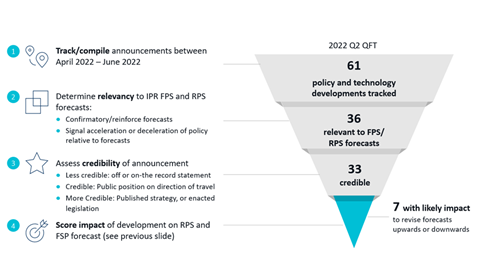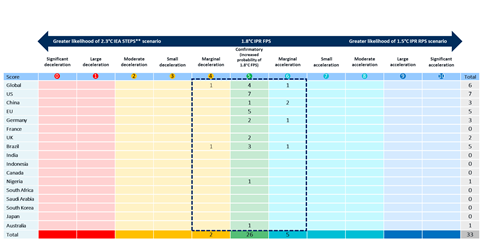This second QFT Update covers the period from April to June 2022.
In Q2, it is evident that there is still positive momentum reinforcing a 1.8C pathway while falling well short of a 1.5⁰C
-
The Quarterly Forecast Tracker monitors momentum and level of ambition on global energy and land transition policy and technology developments. These are assessed against the IPR Forecast Policy Scenario (FPS) which results in 1.8⁰C of warming and are also put in the context of the 1.5⁰C Required Policy Scenario (RPS)
-
In Q2 there is still positive momentum with somewhat increased ambition in terms of developments reinforcing a 1.8⁰C pathway.
-
From COP 26 to the end of June 2022 we track 61 policy and technology developments. Of these, 33 were assessed as having credible impact with 26 confirming our forecast, 5 that provide evidence of increased ambition and 2 indicating a deceleration relative to forecasts.
-
We have introduced a Just Transition lens this Quarter examining the policies reflected in the IPR Quarterly Forecast Tracker and assessing to what extent they integrate Just Transition Principles. Our assessment finds that recent developments in international policy-making confirm that the Just Transition has become a critical concept in international policy-debates, with considerations of equity featuring prominently at COP26 and some subsequent developments.
-
In terms of net impact, we note that on policy the EU edges in the positive direction longer term, China has been somewhat positive, but the US has not moved ahead, while recent policies and proposals in Brazil are likely to increase deforestation. An accompanying paper by Kaya Advisory examines how upcoming election results could drive different forestry policies moving forward.
-
On technology developments, including deployment, there have been positive trends particularly on electric vehicles which accounted for 10% of global sales in 2021, exceeding IPR forecasts.
-
Offsetting this short term has been the security crisis brought on by the Ukraine War leading to use of more fossil fuels in power. The long-term issue is whether this gets “locked in”. In Q1 we addressed this in terms of potential overbuild of capacity for security reasons but with emissions trajectories still manageable through capacity utilization.
-
We note the world economy is slowing short term, which could result in lower growth in emissions.
-
Overall while there are still significant challenges, we believe developments are confirmatory of FPS 1.8⁰C while falling well short of RPS 1.5⁰C.
Quarter 2 Assessment Process
IPR QFT assessments adopts a multi-step approach to assessing key policy and technology developments impacting the IPR 1.8C FPS and 1.5C RPS

Quarter 2 Heat Map
In Q2, the majority of energy/land policy & technology developments mostly show confirmation of IPR forecasts

i. This assessment covers the period from mid-April to mid-June 2022
ii. The IEA’s ‘Stated Policy Scenario’ or STEPS reflects current policy settings based on a sector-by-sector assessment of the specific policies that are in place, as well as those that have been announced by governments
Policy
- Most announcements this quarter are confirmatory including G7 commitments towards 100% clean power with evidence of slight acceleration in renewable power ambition and policies in China
- In the US, a recent announcement to pause restrictions on solar imports reduces the tougher short-term outlook for renewables deployment. The outlook for the US midterm elections will be tackled in Q3
Brazil is the only region where announcements continue to present a challenge. Some recently proposed legislation (e.g. bill to redraw Amazon borders) if passed would impact be a step back in the effort to end net deforestation by 2030, which IPR considers critical for achieving a Paris-aligned pathway – see accompanying IPR paper on Brazil
Technology / Sector Developments
- Multiple announcements confirm or suggest an acceleration in innovation, technology adoption, and costs
- EV sales are increasingly rapidly, exceeding IPR forecasts for growth in certain regions; charging infrastructure will need to grow at pace
- China experienced some grid constraints in accommodating renewables, underscoring importance of grid investment
- Brazil continues to experience high deforestation levels
Just Transition
- An accompanying paper by the LSE finds recent developments in international policy-making confirm that the Just Transition has become a critical concept in international policy-debates, with growing awareness that JT elements are crucial for effective and lasting implementation
- In many cases, Just Transition elements in recent policies are absent or could be considerably stronger. As policies shift to implementation phase, JT elements could feature more prominently.
Read more
IPR Special Paper: Can Lula save the Amazon? A Brazil Policy Analysis
IPR Special Assessment: An assessment of Just Transition elements in the Inevitable Policy Response
IPR Special Paper: Ukraine War: The new geo-politics of energy and implications for climate policy
QFT in 2022
QFT #1 Report covering developments from COP26 to the end of March 2022 is available here.
Each QFT release is accompanied by a Webinar discussing key findings.
Scheduling and details are posted on the PRI Events Page and IPR Social Media:
IPR Briefings
For more information on IPR, signatory briefings and presentations, please contact us at [email protected]
Downloads
Q2 2022 Quarterly Forecast Tracker
PDF, Size 1.45 mbIPR Just Transition Assessment
PDF, Size 0.91 mb












